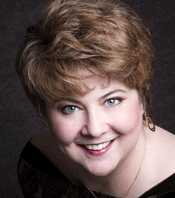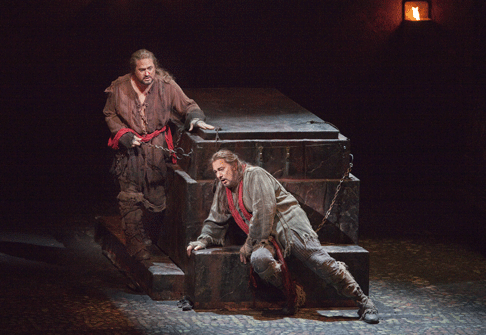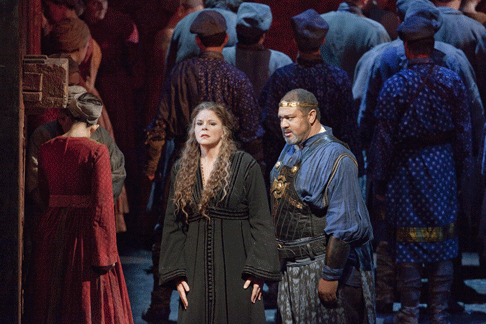It is not a greater or
lesser tradition than the Italian style, but it achieves different dramatic
effects, or the same effects by different means, and individual singers are
often more proficient in one than in the other. Specialists in Gluck being rare
(though he is, happily, going through one of his periodic revivals just now),
one must seek great Gluck singers in other branches of the repertory. Those
trained for Wagner, not too surprisingly, often fit well in the Gluckian glove.
Thus, back in the 1950s, Flagstad and Farrell were both superb as Gluck’s
Alceste and would probably have been exciting as his Iphigénie.
 Elizabeth Bishop [Photo by Sasha Vasiljev courtesy of Barrett Vantage Artists]
Elizabeth Bishop [Photo by Sasha Vasiljev courtesy of Barrett Vantage Artists]
With this in mind, I was intrigued to learn that Susan Graham was indisposed
on the night I attended Iphigénie en Tauride at the Met and would be
replaced by Elizabeth Bishop. I had last heard Bishop as Venus in
Tannhäuser (also a last-minute replacement) and have fond memories of
that performance: a young singer of great authority and potential in dramatic
roles. But Iphigénie is a less one-note conception than Venus; too, she is the
epitome of restraint where Venus is just the opposite.
Gluck’s Iphigénie, taken from Euripides, is a dignified priestess,
torn between her personal, humane, Greek sense of ethics and the demands of the
barbaric society in which she finds herself trapped, demands that include
performing human sacrifices. The screw turns its final gyre when two proposed
victims are her long-lost brother, Oreste, and his friend Pylade. Tension is
provided by the fact that, after fifteen years apart, the siblings do not
recognize each other and somehow never ask each other’s name.
Wouldn’t you tell a priestess your name before she cut your throat?
The situation is resolved in antique high style by the appearance of the
deity, Diane, who rescues the Greeks and abolishes human sacrifice—but
she takes her time to show up (at the end of Act IV), allowing us to comprehend
the noble natures of our legendary characters as they face their predicament.
In Gluck’s stately score dignity is the watchword, though at the Met, in
Stephen Wadsworth’s excessively busy production, Iphigénie is inclined to
hysterical fits and hallucinations. So, for that matter, is Oreste, but he has
an excuse—the Furies drove him mad for his brief fit of matricide back in
Aeschylus’ Oresteia.
 Paul Groves as Pylade and Plácido Domingo as Oreste
Paul Groves as Pylade and Plácido Domingo as Oreste
Bishop sang the priestess-princess with the right stately propriety and a
large, burnished mezzo, but with occasional lapses of evenness, of control,
that suggested she had not fully gauged the demands of this long role. It was
not a fully crafted performance, though a promising one; if Ms. Graham remains
under the weather (Bishop has sung at least one other evening since the one I
attended), another excursion or two should pull it all together. Plácido
Domingo, too, had a cold (and had the Met say so) but, canny codger that he is,
concealed his discomfort behind the craziness Oreste calls for. Not until
Bishop had him on his back on the altar, knife poised above, did the familiar
Domingo sound pour miraculously forth. Paul Groves, as Pylade, had much the
best night of the three leading singers, with an ardent, gleaming sound and
acting that made this two-dimensional sidekick role seem genuinely heroic. Mr.
Groves has usually been regarded as a lightweight, Mozartean tenor, but his
singing here implied that he could take on weightier assignments rewardingly:
Florestan or Samson or (in Domingo’s footsteps) light Wagner. Gordon
Hawkins sang Thoas unimpressively, Julie Boulianne was acceptable as Diane, and
I must say a word about Lei Xu and Cecelia Hall, who made a genuine and joyous
impression in the small roles of Iphigénie’s assisting priestesses. Gluck
obscures no one; his score allows everyone to shine if she or he is able to.
The Met chorus did a tidy a job and Patrick Summers brought out the many
felicities of this gracious, unusual score that sums up so much of where drama
and opera had led by 1779 and predicts so much of what was to come.
 Susan Graham as Iphigénie and Gordon Hawkins as Thoas
Susan Graham as Iphigénie and Gordon Hawkins as Thoas
The Wadsworth production accompanies the “Janissary” percussion
Gluck composed so that we’d know we were in a land of barbarians with
inane and frantic dancing here and there in nooks and landings and crannies of
the set to make us think wild orgies were going on next door. There are also
pointless and tiresome intrusions of the ghosts of persons sung about who have
no business being on stage, where they confuse the casual viewer and annoy the
knowing one. All these things, and Iphigénie’s hysteria could be altered
with a simple restaging. Less easy to comprehend and impossible to forgive is
the positioning of the statue of the goddess in her temple: In all the long
millennia of religious faith, this is surely the only occasion anyone has ever
offered prayers, sacrifices and hymns to the backside of a deity.
Couldn’t they turn her at least ninety degrees and have them offer
sacrifice beside her?
All that aside, it’s a good show.
John Yohalem
![Plácido Domingo as Oreste [Photo by Ken Howard courtesy of the Metropolitan Opera]](http://www.operatoday.com/IPHIGENIE_Domingo_as_Oreste.gif)


